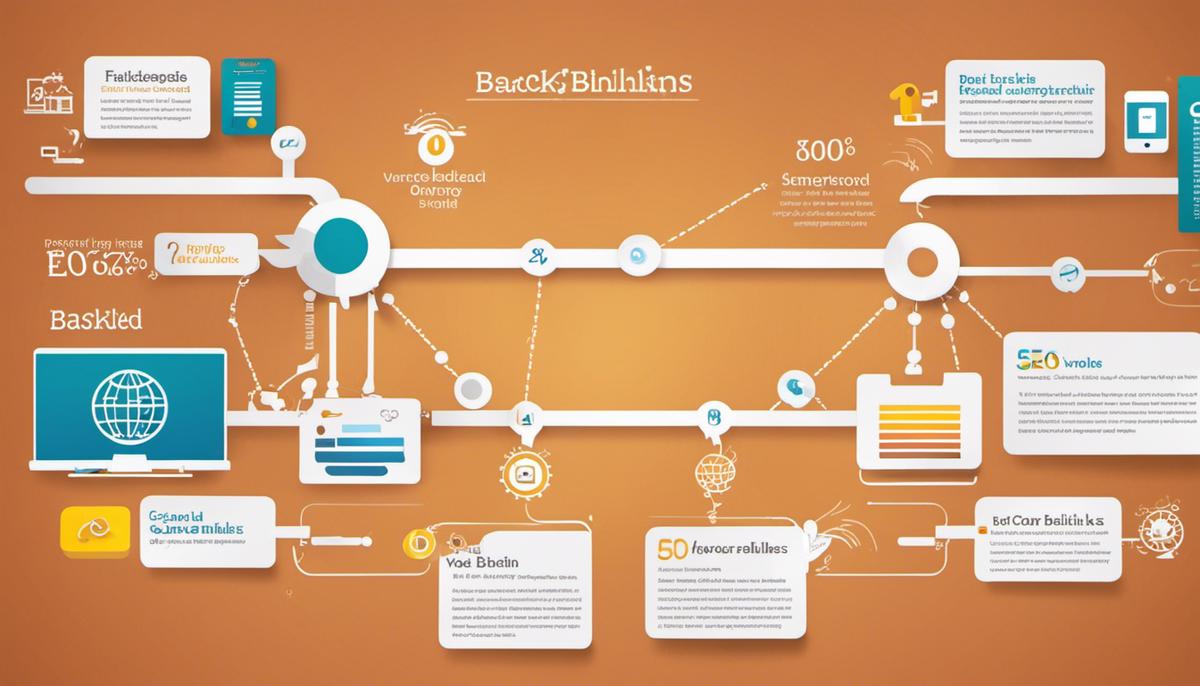BetterYouJourney.com is a participant in the Amazon Services LLC Some of the links in our posts are affiliate links. Click here to see full Disclosure.
As the digital frontier continues to expand, businesses and individuals alike are perpetually looking for ways to increase their online presence, and chief among these methods is the science of Search Engine Optimization (SEO). Highly instrumental in determining the visibility and popularity of websites on search engines, SEO has become a paramount concern for anyone seeking to make a significant impact on the World Wide Web. One of the fundamental concepts within SEO is the use of backlinks, contributing significantly to how websites are ranked by search engines. Among the backlinks, purchased backlinks are getting more attention. But how effective are these purchased backlinks as part of a comprehensive SEO strategy? This exploration delves deep into the mechanics of SEO, purchased backlinks, and their role in enhancing, or potentially undermining, the visibility of your digital footprint.
Understanding SEO and Backlinks
Understanding SEO and Backlinks
Search Engine Optimization, or SEO, is a modern digital discipline focused on increasing the quality and quantity of website traffic through organic search engine results. It entails the optimization of online content, with the aim being that a search engine will show it as a top result for searches of particular keyword(s).
Backlinks, a critical factor in SEO, are links from one website to another. They are a valuable commodity in the digital world because search engines often use them as signals to interpret a site’s authority. When a website receives backlinks from other websites, search engines interpret this as other sites validating its credibility or relevance. Houses, the more backlinks a site earns from high-quality sources, the greater priority search engines assign when determining its rank in search results.
Role of Backlinks in SEO
The role of backlinks in SEO cannot be overstated. They are integral to the algorithms search engines, like Google, use when determining page ranking. Backlinks from authoritative and relevant sources are viewed favorably and can significantly enhance a site’s SEO value.
Not all backlinks, however, are created equal. Links from trusted, high-authority websites hold more weight than links from low-quality or unrelated sites.
Exploring the Effectiveness of Purchased Backlinks
Considering the importance of backlinks, the practice of buying backlinks has emerged as a strategy for companies seeking to improve their SEO performance. However, the effectiveness of this practice is not without controversy.
Purchased backlinks can seem like a quick solution to improve site rankings. However, search engines are advanced and can often detect the artificial manipulation of backlink behavior against its quality guidelines. This could lead to penalties, including the lowering of a site’s ranking or even removal from search results entirely.
Importantly, not all purchased backlinks are detrimental. Services that offer sponsored mentions or support content that links back naturally to the buying website can create authentic backlinks. This should be done while maintaining a focus on high-quality content that offers real value to the audience.
Weighing the Relevance and Authenticity of Purchased Backlinks
Ultimately, purchased backlinks can range from damaging to rewarding, depending heavily on their authenticity and relevance. If the links are low in quality or irrelevant, this not only dilutes the value of backlinks but also risks penalties from search engines.
On the other hand, acquiring high-quality, relevant backlinks from respected sources can raise your site’s authority and SEO ranking. Paying for such links may be justified if it leads to valuable content reaching broader audiences.
Therefore, a strategic and careful assessment of the nature and source of purchased backlinks must precede any decision to engage in such a practice. This approach will help ensure alignment with SEO best practices and the creation of value for audiences, the ultimate goal of any SEO strategy.
In wrapping up, it’s critical to note that the potential enhancement of SEO strategies through the purchase of backlinks hinges largely on the buyer’s ability to critically evaluate their quality, relevance, and authenticity, which are fundamental to securing positive outcomes.

Purchased Backlinks – The Very Basics
Understanding the Basics of Purchased Backlinks
The term “purchased backlinks” essentially refers to backlinks that have been acquired from various sources. These play a critical role in any Search Engine Optimization (SEO) strategy, which is designed to increase a website’s visibility and ranking. Backlinks essentially act as a digital endorsement from one website to another. In other words, when one website links to another, it signifies to search engines like Google that the site has valuable, relevant, and trustworthy content. This is a factor considered in the website’s page ranking algorithm, which can, in turn, elevate its position on search engine results pages (SERPs).
Sources of Purchased Backlinks
Users can obtain purchased backlinks from numerous sources, typically categorized as either link agencies or directly from websites. Link agencies serve as intermediaries, partnering with different websites and selling their links. Websites, on the other hand, might directly sell links to their pages. Generally, the backlinks are embedded within relevant content on the website, such as blogs, articles, or guest posts.
Purchased Backlinks vs. Organic Backlinks
The main difference between purchased backlinks and organic backlinks lies in their acquisition. Organic backlinks are naturally earned when a website links to another without any financial transaction involved. They are generally deemed the most valuable type of backlink as they indicate genuine endorsement of content. On the other hand, purchased backlinks are paid for, and though they may be less valuable in comparison, they still hold weight in SEO strategies.
Pros and Cons of Buying Backlinks
When considering the pros and cons of buying backlinks, some of the notable advantages include the ability to control the anchor text, faster results, and a potential increase in website traffic. Being able to determine the anchor text that is associated with your backlinks is a strong power. However, this should be done thoughtfully as excessive keyword-rich anchor text can look unnatural and potentially harm your SEO.
Purchased backlinks can also deliver quicker results compared to organic linking which happens more gradually through content marketing and PR. If timely results are a priority, this quick effectiveness can be an attractive incentive.
However, there are also cons to consider when purchasing backlinks. Google’s guidelines explicitly state that the buying and selling of links is a practice that manipulates their page rank and is a violation of their rules. There’s always a risk of penalization, leading to dramatic falls in search ranking or being removed from search results entirely.
The quality of purchased backlinks can also vary significantly. Some purchased links might come from dubious websites, which can do more harm than good. Therefore, understanding the quality and relevance of the site you’re linking from is crucial to avoid negative impacts.
Assessing the Impact of Purchased Backlinks within SEO Tactics
Bought backlinks may serve as efficient contributors to SEO tactics. It’s crucial, however, to realize that procuring backlinks forms merely one aspect within an extensive SEO strategy. The effectiveness of these links, whether purchased or resulting from organic reach, is heightened when aligned with other SEO factors such as generating quality content, implementing technical SEO, planning precision-targeted keywords, and developing a superior website design.
In summation, the act of buying backlinks should be approached with informed care, understanding the potential benefits and drawbacks. It’s also important not to over-invest in a single SEO strategy like backlinks purchase. Instead, ensure adopting a diversified, comprehensive approach, increasing your website’s visibility, and ultimately improving its search engine ranking.

Analyzing Effectiveness of Purchased Backlinks
Elucidating the Role of Backlinks in SEO
Backlinks, sometimes referred to as inbound or incoming links, are formed when one website links back to another. These are cornerstone elements in Search Engine Optimization (SEO) and have the capability to significantly elevate a site’s visibility in popular search engines like Google. SEO professionals regularly include backlinking as a tactic in their arsenal with the aim to augment a website’s positioning on the search engine results pages (SERPs).
Purchased Backlinks Vs. Organic Backlinks
There are typically two types of backlinks used in SEO strategies, organic and purchased. Organic backlinks are naturally occurring ones given by other website owners due to the good quality or relevance of a site’s content. On the other hand, purchased backlinks are those obtained through paid services. It might be tempting to pay for backlinks to rapidly boost visibility, but you need to carefully consider the implications of doing so.
Efficiency Analysis of Purchased Backlinks
The effectiveness of purchased backlinks can be hit-or-miss. Anecdotal case studies have shown that they can provide a short-term boost in search rankings. If high-ranking websites link to your page, search engines might deem your content as more relevant and valuable, hence improving your ranking. Purchased backlinks from notable web pages can work efficiently in garnering attention and directing traffic to your site. However, this is not a sure-fire strategy.
Risks Associated with Purchased Backlinks
Unfortunately, the risks associated with purchasing backlinks may outweigh the potential rewards. It’s important to bear in mind that Google and other search engines have sophisticated algorithms designed to recognize and penalize websites that try to manipulate rankings through such practices. If your site has a high number of unnatural backlinks, search engines may penalize it, causing its rank to drop dramatically, or it may even be removed from search results entirely.
Expert Perspectives on Purchased Backlinks
SEO experts generally caution against the use of purchased backlinks. They advocate instead for the creation of high-quality content that will organically generate backlinks. Improving the user interface and experience, regularly publishing relevant content, and engaging in proper keywords and meta tags usage are some recommended ways of garnering organic backlinks.
Studies and Research on Purchased Backlinks
A research study published in the Journal of the Association for Information Systems found that websites could experience a temporary increase in search engine visibility by purchasing backlinks, but in the long term, the practice did not have any significant benefit. This study effectively mirrors the important caveat to bear in mind with purchased backlinks, recognizing it as a short-lived strategy, which can potentially backfire.
The discussion of whether to purchase backlinks as part of your SEO strategy can be complex. Buying these backlinks might offer a sudden rise in your website’s rank, but it comes with potential drawbacks. These include the risk of penalties and drops in rankings, not to mention that the benefits may only be temporary, thus making it an unreliable policy for long-term SEO endeavors.

Purchased Backlinks and SEO Strategy
Deciphering the Role of Purchased Backlinks in SEO Strategies
Acquiring backlinks can dramatically influence the fortification of your website’s SEO strategy. SEO, an acronym for Search Engine Optimization, is a method of refining your digital content to enhance its visibility on Search Engine Results Pages (SERPs). Backlinks, essentially inbound hyperlinks from one webpage to another, are potent tools for SEO enhancement. Given that search engines often perceive a rich web of backlinks as an indication of authoritative, high-quality content, their importance in SEO strategy cannot be overstated.
Quality Over Quantity in SEO Strategies
While purchasing backlinks might seem like a shortcut to improving your SEO, focusing on the quantity over quality of these backlinks can lead to unwanted consequences. Google and other search engines have become increasingly smart in separating artificially generated backlinks from organic ones. The quality of backlinks is primarily determined by the credibility and relevance of the site providing the link. A backlink from a renowned, authoritative website in your industry carries much more weight than a link from an obscure, unrelated source.
Therefore, a successful SEO strategy that incorporates purchased backlinks should focus more on obtaining high-quality backlinks rather than amassing a large quantity of low-quality ones. These strategies might include sponsoring events, investing in influencer outreach, or contributing guest articles to reputable online publications.
Ethical Guidelines and Penalties
Purchased backlinks tread a fine line when it comes to search engine guidelines. Leading search engines like Google have strict rules against link schemes, which include practices intended to manipulate a site’s ranking, such as buying or selling links that pass PageRank. Violating these guidelines can lead to penalties, including demotion in SERPs or removal from search listings altogether.
To avoid any punitive measures, SEO strategies must ensure that purchased backlinks are not used manipulatively and remain within ethical boundaries. Some strategies to appear natural might include diversifying anchor texts, gradually acquiring backlinks over time rather than in a single bulk purchase, and ensuring the relevance and diversity of the linking domains.
Long-term Effects of Buying Backlinks
When managed properly, buying backlinks can positively affect your SEO approach, leading to long-term benefits including promotion of your site’s authority, increasing brand visibility, and attracting relevant traffic. If, however, they are not used wisely, buying backlinks can result in severe penalties that can damage your site’s visibility and reputation in searches. Hence, it is critical to exercise caution when buying backlinks, paying attention to their quality, relevance, and the ethics of your strategy for a more sustainable SEO growth.
In essence, when used appropriately, buying backlinks can significantly aid an SEO strategy. Predicated on the principles of quality and ethical practices, they are instrumental in advancing search engine rankings, leading to higher visibility and increased traffic.

Future of Purchased Backlinks in SEO
A Closer Look at Buying Backlinks in SEO Strategies
Through the years, the landscape of Search Engine Optimization (SEO) has continually evolved, with backlinks established as an integral part of various SEO strategies. Buying backlinks in particular has been the subject of much debate within the SEO community. Essentially, these are links originating from reputable, high-authority websites bought to elevate the SEO rankings of the purchaser’s own site, as opposed to being earned naturally.
Are Purchased Backlinks Effective?
Purchased backlinks, when done rightfully, can be a quick method for boosting a website’s SEO. They can improve a website’s link profile, increase its visibility on search engine results pages (SERPs), and contribute to improved organic traffic. However, this strategy can be risky, especially if the links come from untrustworthy sources, as it could potentially result in penalties from Google and other search engines.
Changes in Algorithms Yields Changing Impact
Over time, the effectiveness of purchased backlinks can depend largely on the changes in search engine algorithms. For instance, Google, the world’s top search engine, has been regularly updating its algorithms to ensure that they provide the best results to users. Some of these algorithm changes can have significant impacts on the valuation of backlinks, including purchased ones. For example, the Google Penguin update, which was designed to penalize websites that used manipulative link building practices, significantly impacted the efficacy of purchased backlinks.
Projecting the Future of Purchased Backlinks in SEO
Industry opinion on the future of purchased backlinks in SEO strategies is varied. Some SEO experts predict that as search engine algorithms continue to evolve, they’ll become even more apt in identifying and disregarding purchased backlinks. This could make this SEO strategy less effective in the future.
However, other experts believe that purchased backlinks will continue to have their place, provided they are used judiciously and combine with high-quality, relevant content. They suggest that instead of focusing solely on buying links, businesses should invest in strategies that foster natural link creation, like content marketing, guest blogging, and social media engagement.
Algorithm Updates and Backlinks Valuation
Backlink valuation is likely to continue to evolve as search engines further refine their algorithms. Factors such as the relevance of the linking site, the authenticity of the links, and the overall integrity of the website’s link profile could potentially take on even more importance. This could mean that the indiscriminate purchasing of backlinks may lose its effectiveness over time. As such, the use of purchased backlinks in an SEO strategy should be monitored closely and complemented with other SEO tactics as part of a well-rounded and flexible digital marketing approach.
Importance of Quality Over Quantity
As search engines get smarter, the age-old adage of ‘quality over quantity’ rings truer than ever for SEO and backlinks. Search engines like Google now prioritize high-quality, relevant backlinks over a large number of poor-quality, irrelevant backlinks. This suggests that the future of purchased backlinks should involve a shift in focus from acquiring a large number of backlinks to ensuring the links are from respected, high-quality sources. This approach will not only survive any potential algorithm changes but also deliver a better user experience, which is ultimately the goal of all major search engines.

The realm of SEO is ever-changing, with modern strategies emphasizing the importance of quality and relevance over an outright volume of content or links. Purchased backlinks, while offering immediate surge in numbers, do not always guarantee lasting success, often carrying the risk of diminishing the stature of the site in the eyes of search engine algorithms. Controversy notwithstanding, the role and future of purchased backlinks in SEO tactics cannot be denied. Navigating the world of SEO necessitates an astute understanding of these dynamics and a foresight to anticipate upcoming trends. While it’s critical to respond dynamically to the evolving SEO landscape, an ethos anchored on ethical guidelines, fostering genuine engagement, and providing valuable content will never go out of style.








